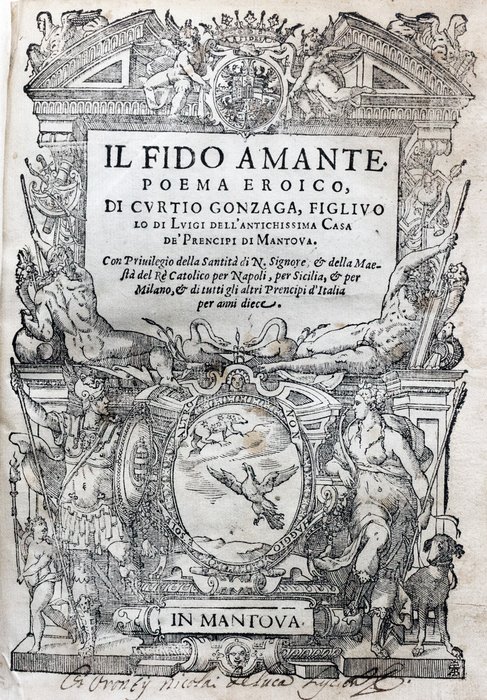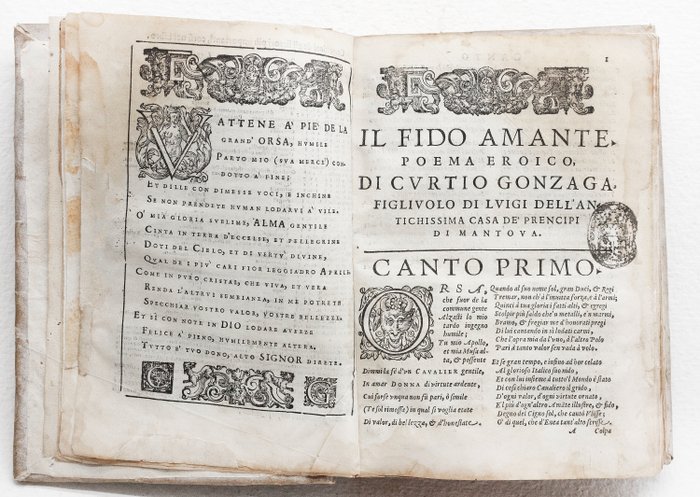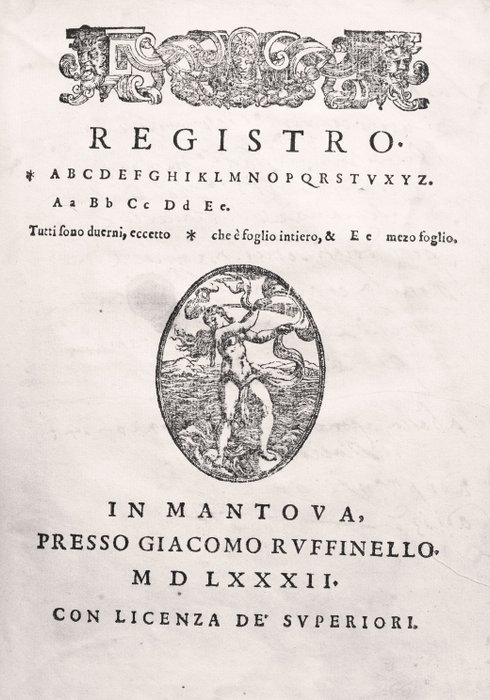Advert Description
Are you interested in this item? This item is up for auction at Catawiki. Please click on "respond to advert" (orange button) to get redirected to the Catawiki website. Catawiki’s goal is to make special objects universally available. Our weekly auctions feature thousands of unusual, rare, and exceptional objects you won’t find in just any store. FIRST EDITION - KHAN'S WAR AGAINST THE KING OF SICILY - ALLIES WITH WIZARDS AND INFERNAL POWERS
The work tells of the war undertaken by Orcano, Great Khan of Persia and India, against the king of Sicily, Crete and Troy. The fulcrum of the epic motif is the eternal struggle between good and evil, complicated by the intervention of the supernatural, with magicians and infernal powers at work now in support of this, now that part.
Upon its appearance, the poem aroused a vast echo of consensus: the imitations were immediately numerous, so much so that they were greatly affected by the contamination of classical and chivalrous elements" (Roberta Monica Ridolfi in "Dizionario Biografico degli Italiani", Volume 57.
Very rare first edition of this poem of 36 cantos in octaves, esteemed at the time and also praised by Tasso (cf. Belloni, Il Seicento, p,156). > Adams, I, G,-856. Olschki-Choix, XII, 18508. Haym, 197.
CONTENTS
Original edition of the chivalrous poem in ottava rima, divided into 36 cantos, also known as "Il Fidamante", the work of the man of letters Curzio Gonzaga (Mantua, 1536-1599), of noble lineage, who represented the duchy at the Peace of Cateau-Cambrésis in 1559.
"Il Fidamante was printed in 1582 (with the title "Il fido Amante", Mantua, G. Ruffinello) and reprinted in 1591 (Venetia, All'insegna del Leone), with added arguments by M. Campiglia. The The beginning of the composition dates back to 1575, but Gonzaga continued to correct and expand it even after the last printing (in the Estense Library of Modena, among the volumes of the Campori legacy, there is a manuscript copy with additions and corrections that are not found in the 1591 edition).
From 1588 to 1590 in his residence in Borgoforte, Gonzaga devoted himself to correcting and revising it, also availing himself of the advice of others, including Scipione Gonzaga, the reviser of Gerusalemme liberata (two copies of the 1582 edition, full of corrections and additions, one can be found in the State Archbishop of Milan, Fondo Galletti, part I, 13; the other in Modena, Bibl. Estense, Autografoteca Campori, part II, century XVI, n. 143).
The "Fidamante", divided into 36 cantos in octaves for about 34,000 verses, is dedicated to the "Orsa", in which Felice Orsini, daughter of Girolamo lord of Bracciano, wife of Marcantonio Colonna, duke of Paliano, died on 27 July 1596.
The work, written in encomiastic function to celebrate the Gonzaga family, narrates the feats accomplished and the trials overcome by a brave knight, Gonzago (born as a mortal, but raised under the loving care of a god) to obtain the love of the woman he loves Hippolyta-Vittoria against the background of the war waged by Orcano, Great Khan of Persia and India, against the kings of Sicily, Crete and Troy. The fulcrum of the epic motif is the eternal struggle between good and evil, complicated by the intervention of the supernatural, with magicians and infernal powers. The Fidamante starts from the expedient of the story narrated in a manuscript: Gonzaga recounts that a pilgrim had given Ippolita Gonzaga the Latin translation of a story engraved on a stone in a barbaric language, found while traveling through Egypt.
CONDITION REPORT
First edition. Leaves (4), 217, (1), numbered only on recto. Contemporary full vellum binding with handwritten titles on the spine with three ribs. Title page illustrated in full-page woodcut, with architectural apparatus surmounted by the Gonzaga coat of arms and allegorical elements with in the center, in an oval, an eagle flying towards the Ursa constellation and the motto "E 'sole Altro non haggio". Interesting coeval manuscript on the back of the last page.
On the recto of the last colophon with allegorical representation in oval of Virtue walking on the water on a dolphin and on the world. On the reverse of the same ancient handwritten notes. Chalcographic cartouches and drop caps. Text in two columns. Various burnishing diffuse halos and spots. Paper restorations in the margins of the first leaves. Abrasion to the inner margin of leaves Z2-Z7 which does not affect the text.
FULL TITLES & AUTHORS
The Trusted Lover. Heroic poem, by Curtio Gonzaga, son of Luigi of the very ancient house of the Princes of Mantua.
With Priuilegio of Sanctity of N. Signore della Maestà del Re Catolico for Naples for Sicily & for Milan and of all the other Princes of Italy for ten years.
In Mantua [at the Colophon] At Giacomo Ruffinello, 1582.
Curzio Gonzaga 67220341





